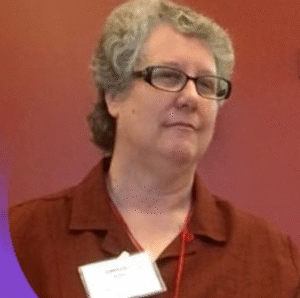
With a career rooted in faith, purpose and service, Julie Taylor has emerged as a powerful advocate for social justice, building bridges between communities and strengthening the organizations that support them. As executive director of the National Farm Worker Ministry in Raleigh, North Carolina, she leads efforts to uplift farm worker voices, advocate for policy change and nurture partnerships that address systemic inequities. Through direct engagement with marginalized populations and a steady hand in organizational leadership, she advances both practical support and long-term solutions. Her responsibilities encompass financial oversight, human resources management and strategic development, all informed by her deep experience in public speaking, theological study and relationship-building.
Ms. Taylor’s academic journey helped shape her commitment to service and equipped her with the tools to lead effectively in faith-based and nonprofit settings. She holds a Master of Arts in Christian formation and leadership from Spring Arbor University and a Bachelor of Arts in Christian education from Asbury University. Her certification in Christian education within the Methodist Church further reflects her dedication to grounding her work in spiritual principles. These credentials have contributed to her holistic approach to leadership, where theological insight and practical skill converge in support of justice-centered missions.
Before assuming leadership at the National Farm Worker Ministry, Ms. Taylor was a child, youth and family advocate for United Methodist Women in New York. In that role, she worked to dismantle systemic barriers faced by low-income individuals and families, particularly in areas such as public education access and domestic violence prevention. She launched and managed issue-based campaigns while reinforcing internal operations, bringing consistency and capacity to the organization’s broader advocacy agenda. Her work emphasized empowerment and sustainability, both for the people she served and for the institutions she helped to guide.
Ms. Taylor’s foundation in nonprofit leadership was laid through her tenure as director of a small, community-based organization in Virginia. At the time of her appointment, the organization was grappling with instability and turnover. Under her guidance, the nonprofit developed clear systems, healthy practices and a renewed sense of purpose. Her leadership during those years shaped her belief in longevity, relational trust and the importance of building solid institutional structures to support mission-driven work.
In addition to her professional commitments, Ms. Taylor has actively contributed to civic life through board service with Affirmation and other justice-oriented groups. She is known for her collaborative style, valuing coalition-building as a path toward broader social change. Her colleagues often speak of her as a connector and facilitator, someone who invites others into the work with care and conviction.
Outside her career, Ms. Taylor enjoys spending time with loved ones, traveling, assembling jigsaw puzzles and watching baseball, especially at local and minor league stadiums. These personal interests offer her space for reflection and joy, grounding her in the relationships that matter most.
As she looks ahead, Ms. Taylor envisions a future where the National Farm Worker Ministry achieves financial resilience and gains wider visibility. She plans to shift her focus from administrative responsibilities to programmatic development, with the goal of becoming more directly involved in facilitating learning and engagement. Driven by a lifelong commitment to justice and transformation, she continues to inspire those around her with a steady vision and a heart for community.
